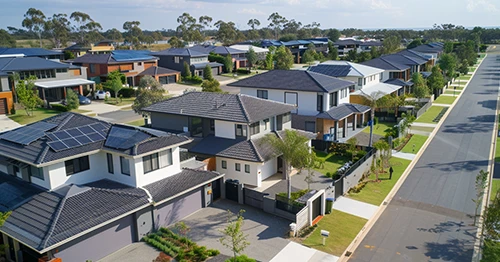Updated: 22 Jul, 2024
The 2024-25 NSW Budget has landed, bringing with it a mix of opportunities and challenges that could affect everyone from homebuyers to public-sector workers. Let’s dive into the details and explore who’s coming out on top and who’s feeling the pinch.
Who’s Winning?
- Homebuyers And Renters: This budget is a breath of fresh air for those struggling to find affordable housing. The government is pouring $5.1 billion into building social housing, including 8400 homes, of which 6200 will be new and 2200 will be replacements (with priority given to survivors of domestic and family violence). This program also invests $1 billion to repair 33,500 existing social homes. TIn total, the government has vowed to deliver up to 30,000 homes, including 21,000 new and affordable homes that will be built on government-owned land.
- Healthcare Sector: The health sector is receiving a shot in the arm with $274.7 million allocated for new hospitals and $480.7 million to reduce emergency department wait times and support urgent-care services.
- Public-Sector Workers: Public-sector workers are set to benefit from a 10.5% wage increase spread over the next three years. This includes a $1000 cost-of-living adjustment as a cushion against unexpected inflation hikes. It’s a move designed to attract and retain essential workers, ensuring that the state’s public services remain robust and effective.
- Victims Of Domestic And Family Violence: The budget sets aside $245.6 million over four years to support victims of domestic and family violence. This includes funding for new refuges, violence prevention initiatives, and improved legal support.
- Communities In Need: In the wake of recent natural disasters, $5.7 billion is earmarked for disaster response and recovery. This includes funds for road repairs, flood resilience programs, and restoring community infrastructure.
- Low-income households: Low-income families will benefit from continued cost-of-living support, which includes energy bill relief, subsidies for preschool fees, and a cap on weekly tolls. These initiatives aim to alleviate daily financial pressures, making it easier for families to manage their budgets.
- Homeless Residents: A total of $527.6 million is allocated for emergency housing and homelessness support services. This includes $260 million for crisis accommodation and $250 million to support individuals at risk of homelessness, such as those transitioning from correctional facilities and mental health services.
Who’s Losing?
- Higher Tax Brackets: Tax bracket creep continues to bite, particularly affecting higher income earners. As inflation pushes incomes into higher tax brackets, these households face reduced income.
- New Home Buyers: For those looking to step onto the property ladder, the outlook remains challenging. The cost of servicing a mortgage on a new home has skyrocketed, particularly in places like Western Sydney, where it’s up 55%. This makes it harder for new buyers to afford their first home, despite the increased housing supply.
- Western Sydney Residents: Western Sydney is bearing the brunt of rising living costs. Rents have surged by 25.8% since April 2022, and mortgage costs are higher than in other regions. This is creating a financial squeeze for many families, exacerbating the challenges of finding affordable housing.
- Government Sector: The state government is facing fiscal pressures. The budget projects a $3.6 billion deficit for 2024-25, necessitating a suspension of contributions to the NSW Generations Fund and a redirection of funds towards essential services and infrastructure. This highlights ongoing financial challenges and the tough decisions being made to balance the books.
- Foreign home buyers: The state’s foreign purchaser duty surcharge will increase from 8% to 9% from 2025, and the foreign owner land tax surcharge will increase from 4% to 5%.
Adjustment To Foreign Investor Surcharges And Indexation Of Land Tax Thresholds
The NSW Government announced adjustments to foreign investor surcharges to increase housing availability for residents. Starting 1 January 2025, the foreign purchaser duty surcharge will rise from 8% to 9%, and the foreign owner land tax surcharge will increase from 4% to 5%.
These changes aim to make more properties accessible to NSW residents and ensure foreign investors contribute fairly to infrastructure and housing costs. With around 20,000 foreign-owned residential properties in NSW, these adjustments are large.
Introduced in 2017, the foreign owner land tax surcharge rose from 2% in 2018 to 4% last year. The foreign purchaser duty surcharge, introduced in 2016 at 4%, doubled to 8% by 2017. These incremental increases balance the benefits of foreign investment with local community support.
The NSW Government will also adjust land tax thresholds from the 2024 land tax year onwards, maintaining their value over time and aligning with other Australian states. These changes are projected to generate an additional $1.68 billion over four years, helping to address the housing crisis.
Insights From Home Loan Experts
In response to the recently announced NSW Budget 2024-25, homeloanexperts.com.au Senior Mortgage Broker Jonathan Preston and CEO Alan Hemmings provide their perspectives on the budget’s implications for investors, non-residents and first-home buyers.
Preston: “The budget continues to put pressure on property owners through increased taxes. The decision to freeze land tax thresholds means that owners of investment properties, holiday homes, and commercial real estate will face additional costs. Specifically, the tax-free threshold remains at $1.075 million, leading to a $1.5 billion increase in land taxes and affecting approximately 35,000 more homeowners.
Furthermore, the foreign purchaser duty surcharge will rise from 8% to 9% in 2025, and the foreign owner land tax surcharge will increase from 4% to 5%. This shift disproportionately affects non-residents, who have limited means to contest these changes. The budget fails to address the broader regulatory and cost-related challenges facing the building industry, which I believe are bigger issues than approvals.”
Hemmings: “I agree with everything Jonathan said. I am not seeing anything beyond the changes to zoning around transport hubs, which was previously announced, that will fix the core issue of housing supply. In fact, the additional taxes on investors (multiple properties and foreign owners) may worsen the situation for renters. Also, I have not been able to find any changes to First Home Buyer schemes, so there was no assistance for them.”
Talk To An Expert
The 2024-25 NSW Budget paints a complex picture. While there are investments in housing, healthcare, and support for vulnerable communities, the broader economic challenges remain daunting. High mortgage costs, rising living expenses, and pressures on the government suggest that while steps are being taken in the right direction, the road to economic stability and affordability is still long and winding for NSW.
Call us at 1300 889 743 or complete our free online assessment form to see how we can help you.





